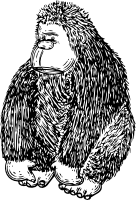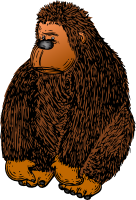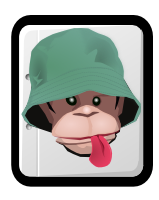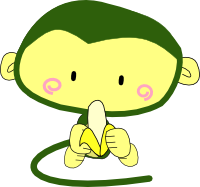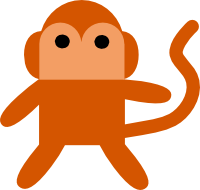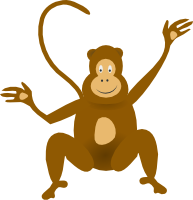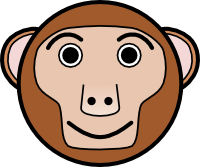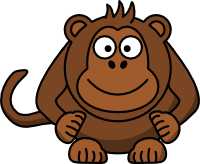Associations to the word «MONKEY»
Noun
- Spider
- Mammal
- Lizard
- Mouse
- Sturgeon
- Sugarcane
- Cat
- Sable
- Supernova
- Beet
- Flycatcher
- Sucker
- Wrench
- Surveying
- Microorganism
- Cypress
- Marlin
- Whales
- Extinction
- Microscopy
- Mite
- Spectrometry
- Experiment
- Chimpanzee
- Primate
- Spore
- Ape
- Sponge
- Mir
- Microscope
- Squirrel
- Mint
- Bird
- Eel
- Monkey
- Sulfur
- Setup
- Mold
- Spectroscopy
- Mole
- Swamp
- Microwave
- Technician
- Dioxide
- Gibbon
- Mollusk
- Headache
- Dinosaur
- Momentum
- Parrot
- Pi
- Cortex
- Monarch
- Gorilla
- Swallow
- Herd
- Paw
- Geometry
- Leopard
- Mineral
- Swan
- Antelope
- Agility
- Worm
- Rodent
- Harlow
- Dot
- Strip
- Neuron
- Chemical
- Zoo
- Crocodile
- Brass
- Fisher
- Migration
- Panda
- Cymbal
- Lr
- Zebra
Adjective
Verb
Pictures for the word «MONKEY»
Wiktionary
MONKEY, noun. Any member of the clade Simiiformes not also of the clade Hominoidea containing humans and apes, from which they are usually, but not universally, distinguished by smaller size, a tail, and cheek pouches.
MONKEY, noun. (informal) Any primate, including apes.
MONKEY, noun. (informal) A mischievous child.
MONKEY, noun. (British) (slang) Five hundred pounds sterling.
MONKEY, noun. (slang) A person or the role of the person on the sidecar platform of a motorcycle involved in sidecar racing.
MONKEY, noun. (slang) A person with minimal intelligence and/or an unattractive appearance
MONKEY, noun. (blackjack) A face card.
MONKEY, noun. (slang) A menial employee who does a repetitive job, as in code monkey, grease monkey, phone monkey, powder monkey.
MONKEY, noun. The weight or hammer of a pile driver; a heavy mass of iron, which, being raised high, falls on the head of the pile, and drives it into the earth; the falling weight of a drop hammer used in forging.
MONKEY, noun. A small trading vessel of the sixteenth century.
MONKEY, verb. (informal) To meddle; to mess with; to interfere; to fiddle.
MONKEY AROUND, verb. (idiomatic) To act foolishly.
MONKEY BARS, noun. (collective plural) A jungle gym
MONKEY BARS, noun. (collective plural) A row of bars, found on playgrounds, under which one hangs by the arms and crosses by swinging between bars, legs dangling down, like how a monkey might move across.
MONKEY BLOCK, noun. (nautical) A small single block strapped with a swivel.
MONKEY BOY, noun. (pejorative) Term of offense directed at one who assumes perceived traits of a monkey, e.g. excessive hairiness or impish behaviour.
MONKEY BOY, noun. (pejorative) (science fiction) Term of offense directed at humans in general.
MONKEY BOYS, noun. Plural of monkey boy
MONKEY BREAD, noun. A type of gourd, the fruit of a baobab tree, Adansonia digitata, eaten by monkeys
MONKEY BREAD, noun. The tree itself
MONKEY BREADS, noun. Plural of monkey bread
MONKEY BUSINESS, noun. (US) (slang) Wasting time, or effort, on some foolish project.
MONKEY BUSINESS, noun. An activity that is considered silly, or stupid, or time-wasting.
MONKEY BUSINESS, noun. (idiomatic) An activity that may be considered illegal, questionable, or a vice, but not felonious.
MONKEY CUP, noun. Any of the tropical pitcher plants in the genus Nepenthes
MONKEY CUPS, noun. Plural of monkey cup
MONKEY FLIP, noun. (professional wrestling) A move in which a wrestler takes his opponent and flips that person over his head.
MONKEY GAFF, noun. (nautical) A light gaff attached to the topmast for the better display of signals at sea.
MONKEY HANGER, noun. (Teesside) (Northeast England) (offensive) A person from Hartlepool.
MONKEY HANGERS, noun. Plural of Monkey Hanger
MONKEY HUMPING A FOOTBALL, noun. (vulgar) Energetic but useless action, or a person engaged in such action.
MONKEY HUMPING A FOOTBALL, noun. (vulgar) A manner of riding a horse, motorcycle or other vehicle, in which the rider crouches forward and may bounce in the saddle.
MONKEY IN THE MIDDLE, noun. (games) A children's game in which two players keep an object away from a third player (who is in between them) by throwing it past that player.
MONKEY JACKET, noun. (dated) A type of close-fit jacket worn by sailors
MONKEY JACKET, noun. A semiformal lightweight jacket, usually made of nylon, with striped cuffs and neck, similar to an MA-1 flight jacket.
MONKEY JACKETS, noun. Plural of monkey jacket
MONKEY MEAT, noun. (US) (military slang) Tinned meat.
MONKEY ON ONE'S BACK, noun. (idiomatic) An addiction, especially to narcotic drugs.
MONKEY ON ONE'S BACK, noun. (idiomatic) A state of persistent distress or worry or the cause of such a state.
MONKEY PATCH, noun. (programming) (neologism) A patch which alters the behaviour of a program by forcefully overriding aspects of the original code at runtime.
MONKEY PATCH, verb. (programming) (neologism) To alter the behaviour of a program by forcefully overriding aspects of the original code at runtime.
MONKEY PATCHED, verb. Simple past tense and past participle of monkey patch
MONKEY PATCHES, verb. Third-person singular simple present indicative form of monkey patch
MONKEY PATCHING, verb. Present participle of monkey patch
MONKEY PUZZLE, noun. A large coniferous tree, Araucaria araucana, native to Chile. [from 19th c.]
MONKEY RAIL, noun. (nautical) A second and lighter rail raised about six inches above the quarter rail of a ship.
MONKEY SLUG, noun. The larva of the hag moth.
MONKEY SUIT, noun. Man's formal suit worn in the evening; tuxedo
MONKEY SUIT, noun. (jocular) uniform
MONKEY SUITS, noun. Plural of monkey suit
MONKEY TRAIL, noun. (western Canadian) A beaten path where children play.
MONKEY TRAILS, noun. Plural of monkey trail
MONKEY TRAP, noun. (literally probably folk-lore) A cage containing a banana with a hole large enough for a monkey's hand to fit in, but not large enough for a monkey's fist (clutching a banana) to come out. Used to "catch" monkeys that lack the intellect to let go of the banana and run away.
MONKEY TRAP, noun. (figuratively) A clever trap of any sort, that owes its success to the ineptitude or gullibility of the victim.
MONKEY WARD'S, proper noun. (US) (slang) Montgomery Ward, an American retail enterprise.
MONKEY WRENCH, noun. A wrench (spanner) with an adjustable jaw.
MONKEY WRENCH, noun. (idiomatic) An unexpected or troublesome problem, obstacle or dilemma.
MONKEY WRENCHES, noun. Plural of monkey wrench
Dictionary definition
MONKEY, noun. Any of various long-tailed primates (excluding the prosimians).
MONKEY, noun. One who is playfully mischievous.
MONKEY, verb. Play around with or alter or falsify, usually secretively or dishonestly; "Someone tampered with the documents on my desk"; "The reporter fiddle with the facts".
MONKEY, verb. Do random, unplanned work or activities or spend time idly; "The old lady is usually mucking about in her little house".
Wise words
In words, as fashions, the same rule will hold; Alike
fantastic, if too new, or old: Be not the first by whom the
new are tried, Nor yet the last to lay the old aside.

